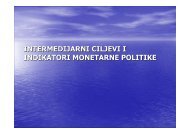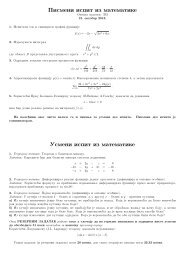WHITE BOOK 2004 EBU Tournament Directors' Guide Edited by ...
WHITE BOOK 2004 EBU Tournament Directors' Guide Edited by ...
WHITE BOOK 2004 EBU Tournament Directors' Guide Edited by ...
You also want an ePaper? Increase the reach of your titles
YUMPU automatically turns print PDFs into web optimized ePapers that Google loves.
White Book – November 2003 – Chapter IV<br />
16.4 "Hesitation Blackwood"<br />
The partner of a Blackwood bidder is normally expected to accept his partner's<br />
decision, and when that decision is after a pause for thought, it is not permitted to<br />
continue except when partner "cannot" have a hand on which slam will fail.<br />
While this is the normal case there are particular positions where it might be acceptable<br />
for a player to continue, which include:<br />
Responder holds an unshown but useful void.<br />
Because he has miscounted responder has more aces than he has shown<br />
After a response showing 0/3, 0/4 or 1/4, responder has the higher value.<br />
16.5 A short hesitation after an unexpected call<br />
A short hesitation following an unexpected call <strong>by</strong> an opponent would not necessarily<br />
be considered to be a departure from normal tempo or to transmit significant<br />
unauthorised information.<br />
However, a “bounce” in response to a pre-empt should not be regarded as unexpected.<br />
16.6 Logical alternative<br />
A “logical alternative” is a call or play which three or more in ten players of equal ability<br />
could be expected to make in the particular situation, if playing a similar system and<br />
style, but if the irregularity had not occurred.<br />
The converse of this is that if the TD or Appeals Committee is satisfied that over seven<br />
in ten of his peers would make a particular call, such call is evident and it is legal to<br />
make such a call whatever the unauthorised information involved.<br />
These definitions are modified somewhat if there are several possible alternatives. For<br />
example, if there are five apparent actions, and it would be expected that two players<br />
out of ten would find each one then they are all logical alternatives.<br />
Example West opened 1, North passed slowly and East passed. The TD might<br />
conclude that Pass, 1NT, double, 2 and 2 might all be found <strong>by</strong> a similar<br />
number of the player’s peers, so all are logical alternatives.<br />
It should be noted that the standards are different nearly everywhere else in the world.<br />
Outside North America the normal standard is one player in four. The WBF have<br />
published a definition with no mention of numbers – see “Use of unauthorized<br />
information” in the Appendix WBF Code of Practice – see Section XVIII.<br />
Knowledge of the player is used when deciding what players of equal ability might do.<br />
If the player is unknown to the TD or Appeals Committee it is best to assume he is<br />
average for the competition.<br />
16.7 Think before you adjust!<br />
There is a problem when a player has unauthorised information available from partner,<br />
and chooses the successful action from amongst logical alternatives. It is very easy,<br />
but incorrect, to adjust without fully investigating whether the unauthorised information<br />
suggests the chosen action rather than another.<br />
33





